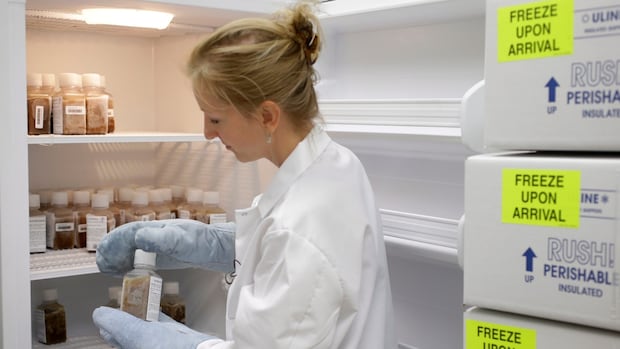
How a lot does your gut well being impact your general well being? So much, the physician says
You can hear a lot about intestine microbiome these days – it is mentioned everywhere from wellness podcast to grocery corridor. Doctors are tapping some diseases differently and tapping in it to treat it differently.
The intestine microbiom is a community of all bacteria and viruses in our intestines, which include friendly microbes that promote health and at the same time some enemies can cause disease.
Is a developed process Fecal transplantWhere a small sample of stool from a healthy person’s colon is given to a recipient for medical purposes. Despite the ICK factor, they have been used to treat potential, deadly, recurring bacterial infections, for which antibiotics have been less effective.
Now, doctors and researchers want to see if fecal transplant can be used for other hard-to-treat diseases.
Avoiding scorched earth
Health Canada recurrent C. Approves fecal transplant for deficile infection In 2015While affecting the colon, these infections cause diarrhea and, if recurring, dehydration that can wreak havoc on the body. Target healthy bacteria with transplant c. Dificile is to get out and eradicate stubborn infection.
Overall, recurrent c. For deficile, fecal transplant was enough more effectiveFor antibiotics, compared to less than 50 percent, more than 85 percent.

A pediatric gastroenterologist and Associate Clinical Professor at McMaster University, Hamilton. Nikhil Pai said that antibiotics can create a terrible cycle.
Pai said, “This scorching antibiotic is a survival bacteria that can not only make things worse, but can affect many other things such as general nutrition and metabolism.”
In adults, 2023 review Clinical trials published by the respected Cocrain Library concluded that fecal transplant can also help control Crohn’s disease and ulcerative colitis, inflamed inflamed intestinal disease that damages the intestine when the body’s immune system accidentally attacks.
Fakel transplant c. A lot of promises have been shown for diseases like Difficle. As the claimed list claimed for use of treatment increases, we argue myths
Professor Bruce Vallance of Pediatrics at the University of British Columbia said that inflammatory bowel disease is essentially chronic inflammation of the gastrointestinal tract, which is probably triggered by our intestinal bacteria. This can happen at any age, he said.
“We are trying to find out if some germs are getting disease and whether we can target those microbes, remove them and hope to remove them from the intestine, so there is no trigger for the disease anymore.”
Some researchers are also watching Using fecal transplant for adolescent anorexia nervosaHe is known for his difficulty for treatment and high mortality. Research suggests that there is an intestinal-brain connection, and scientists are aware that there is a connection between imbalance in anorexia and intestine microbiom, which can affect a person’s behavior.
Building sleeve ‘mini gut’
Vallance and their team are also studying whether some microbes that can run cruhan and colitis can obtain through a major mucus layer in the intestines.
By that end, he is working with doctors at BC Children’s Hospital, which is to take fecal samples and biopsy, which is going on in the human colon.

Valence makes “mini gut” – a 3D model of the intestines in the shape of a ball – how to study germs. He is focusing on growing bacteria in epithelium, or intestinal lining, which contains protein with sugars on them that form a thin coating.
“It doesn’t feel good and it doesn’t feel good, but this sticky coating is really important how we interact with germs of our intestine,” Valnes said. This is the one that creates obstacles against dangerous bacteria that can cause diseases such as Crohn and Colitis.
Another test focuses on small bowel syndrome in children who have removed parts of their small intestine from surgery. This can cause excessive manufacture of bacteria, causing abdominal pain, inflammation and diarrhea that is traditionally treated with antibiotics.
There are other unknown benefits of fecal transplant. Pai recalled, while in his other position at the Children’s Hospital in Philadelphia, treated an autistic child, in which the recurrent C. Was deficile.
“After his treatment, the family’s comments were that the child was noted by his teachers in school with just some real improvement and change in their behavior,” Pai said. “I don’t think it’s surprising that his other aspects also got better.”
What do we eat
Bringing healthy bacteria also benefits the body as a whole, Pai said, which is why the boy saw improvements in other areas.

“Comment or the idea that what we eat is very true,” said Valance.
He said that what we eat and digest is also different to that extent, as long as everyone is like a fingerprint – or the print, he said. “Everyone has their own unique blueprint.”
When people eat a high-fiber diet filled with vegetables, for example, more fiber reaches the colon, where microbes fermented it and released beneficial factors such as Beetirate, A small chain fatty acids.
Vallance stated that the beutirate can help indicate our immune system what to do and when to do. But people with inflammatory bowel disease have very little butterflies, which is an assistant regulator to prevent the immune system from overacting, he said.
Carrie Daniel McDogog, an associate professor in the Department of Epidemiology of Anderson Cancer Center, MD in Houston, specializes in nutrition and microbiom, including the role of dietary fiber.

The Daniel McDogal and his team showed that the intestine microbiome of cancer patients replaced within eight weeks by adding dietary fiber as canned beans and is thought to encourage the beneficial intestine bacteria to speak.
Cancer prevention guidelines already emphasize growing fibers with beans, as well as fruits and vegetables, with full foods.
Daniel McDogal said, “We are learning a lot about scientific mechanisms and intestine microbiomes, it has a great impact on public health.” Intestinal health “has a lot of crossover with other diseases like heart disease, inflammatory bowel disease.
“We are all learning from each other’s research.”
